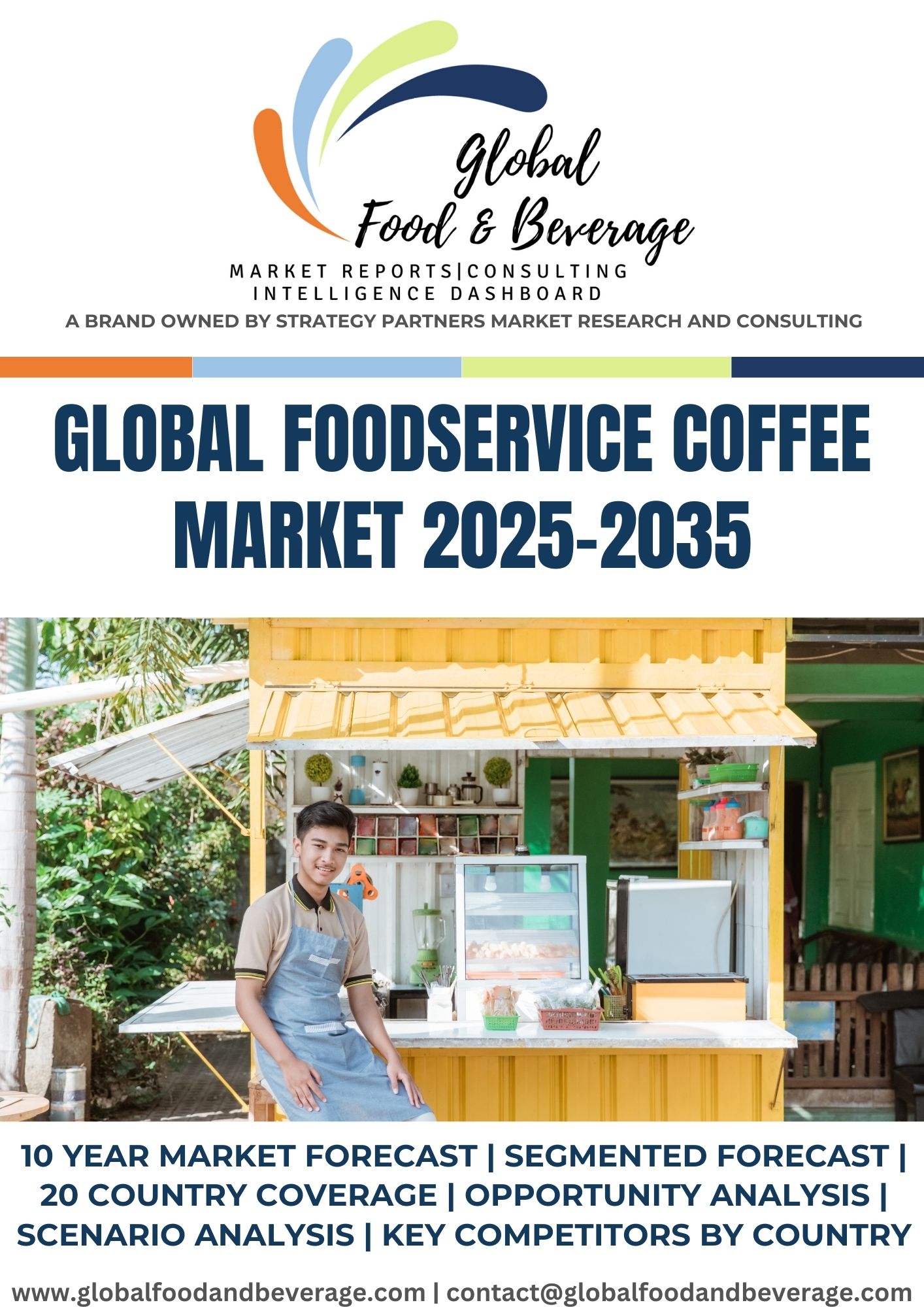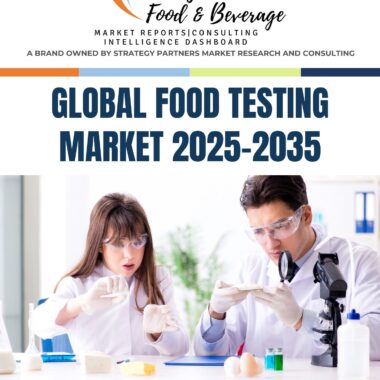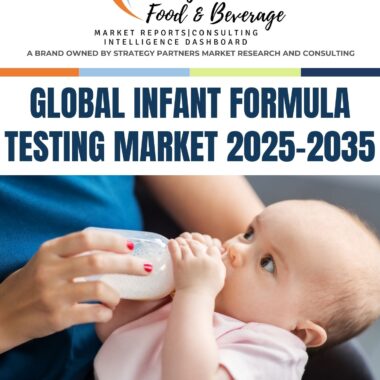Description
Global Foodservice Coffee Market is coffee that is served in restaurants, cafes, and other foodservice establishments. Foodservice coffee can be served in a variety of forms, such as brewed coffee, espresso, and cappuccino. Foodservice coffee is often made with high-quality coffee beans and is roasted and ground to specific specifications.
Key trends driving the growth of the global foodservice coffee market:
Increasing demand for foodservice coffee from the food and beverage industry: The food and beverage industry is the largest consumer of foodservice coffee. Foodservice coffee is used in a variety of food and beverage products, such as coffee drinks, pastries, and desserts. The growing demand for processed food and beverage products is driving the demand for foodservice coffee.
Growing awareness of the health benefits of coffee: Coffee has been shown to have a number of health benefits, such as reducing the risk of type 2 diabetes, Parkinson’s disease, and Alzheimer’s disease. Coffee also contains antioxidants, which can help to protect cells from damage. The growing awareness of the health benefits of coffee is driving the demand for foodservice coffee.
Rising disposable incomes in developing countries: The rising disposable incomes in developing countries are leading to increased demand for foodservice coffee. Consumers in developing countries are increasingly demanding high-quality and nutritious food and beverage products. Consumers in developing countries are also increasingly demanding personal care products and pharmaceuticals that are made with natural ingredients. The rising disposable incomes in developing countries are driving the demand for foodservice coffee.
Key product segments in the global foodservice coffee market:
Roasted coffee beans: Roasted coffee beans are the largest product segment in the global foodservice coffee market growth. Roasted coffee beans are used to make brewed coffee, espresso, and cappuccino. Roasted coffee beans are available in a variety of roasts, such as light roast, medium roast, and dark roast.
Instant coffee: Instant coffee is the second largest product segment in the global foodservice coffee market. Instant coffee is made from dehydrated coffee extract. Instant coffee is a convenient and affordable way to make coffee.
Ground coffee: Ground coffee is the third largest product segment in the global foodservice coffee market. Ground coffee is made by grinding coffee beans. Ground coffee is used to make brewed coffee, espresso, and cappuccino.
Key distribution channels in the global foodservice coffee market:
Direct sales: Direct sales are the largest distribution channel for foodservice coffee. Direct sales involve manufacturers selling foodservice coffee directly to food and beverage establishments.
Distributors: Distributors are another important distribution channel for foodservice coffee. Distributors purchase foodservice coffee from manufacturers and sell it to food and beverage establishments.
Online retailers: Online retailers are also becoming an important distribution channel for foodservice coffee. Online retailers sell foodservice coffee to food and beverage establishments, as well as directly to consumers.
Key challenges facing the global foodservice coffee market:
Regulatory challenges: The regulation of foodservice coffee varies from country to country. This can make it difficult for foodservice coffee manufacturers to market their products globally.
Cost of foodservice coffee: The cost of foodservice coffee can be high. This can make it difficult for small and medium-sized businesses to afford foodservice coffee.
Lack of awareness of foodservice coffee: Some consumers are not aware of foodservice coffee or the benefits it offers. This can make it difficult for foodservice coffee manufacturers to market their products to consumers.
Additional thoughts on the global foodservice coffee market:
The Global Foodservice Coffee market forecast for organic and natural foodservice coffee is growing rapidly. This is due to the increasing demand for organic and natural food and beverage products.
The Global Foodservice Coffee market analysis for foodservice coffee in developing countries is expected to grow significantly in the coming years. This is due to the rising disposable incomes and the growing awareness of the health benefits of coffee in developing countries.
Foodservice coffee manufacturers are focusing on developing new and innovative products to meet the changing needs of the market. For example, some foodservice coffee manufacturers are developing foodservice coffee that is more affordable, faster, and more accurate.
Conclusion
The global foodservice coffee market trends is expected to continue to grow in the coming years. This is due to the increasing demand for foodservice coffee from the food and beverage industry, the growing awareness of the health benefits of coffee, and the rising disposable incomes in developing countries
Table of Content
1 Market Introduction- Global Foodservice Coffee Market
1.1 Market Segmentation- Global Foodservice Coffee Market
1.2 Key Trends- Global Foodservice Coffee Market
1.2.1 Drivers
1.2.2 Restraints
1.2.3 Challenges
2 Global Market Forecast- Global Foodservice Coffee Market
1. By Region
2. By Type of Coffee Bean
3. By Coffee Machine
4. By Type
5. By Food Service Outlet
3 Country Wise Forecast- Global Foodservice Coffee Market
3.1 US
3.1.1 Key Trends
3.1.2 Consumer Spending
o Population
o GDP
o CPI
o Spend per Capita
o Spend as a proportion of GDP
3.1.3 Market Forecast- US Foodservice Coffee Market
1. By Type of Coffee Bean
2. By Coffee Machine
3. By Type
4. By Food Service Outlet
3.1.4 Key Competitors- US Foodservice Coffee Market
3.1.5 EXIM
3.1.6 Patents
3.1.7 Scenario Analysis- US Foodservice Coffee Market
3.1.8 Opportunity Analysis- US Foodservice Coffee Market
3.2 Canada
3.2.1 Key Trends
3.2.2 Consumer Spending
o Population
o GDP
o CPI
o Spend per Capita
o Spend as a proportion of GDP
3.2.3 Market Forecast- Canada Foodservice Coffee Market
1.By Type of Coffee Bean
2.By Coffee Machine
3.By Type
4. By Food Service Outlet
3.2.4 Key Competitors- Canada Foodservice Coffee Market
3.2.5 EXIM
3.2.6 Patents
3.2.7 Scenario Analysis- Canada Foodservice Coffee Market
3.2.8 Opportunity Analysis- Canada Foodservice Coffee Market
3.3 UK
3.3.1 Key Trends
3.3.2 Consumer Spending
o Population
o GDP
o CPI
o Spend per Capita
o Spend as a proportion of GDP
3.3.3 Market Forecast- UK Foodservice Coffee Market
1.By Type of Coffee Bean
2.By Coffee Machine
3.By Type
4. By Food Service Outlet
3.3.4 Key Competitors- UK Foodservice Coffee Market
3.3.5 EXIM
3.3.6 Patents
3.3.7 Scenario Analysis- UK Foodservice Coffee Market
3.3.8 Opportunity Analysis- UK Foodservice Coffee Market
3.4 Germany
3.4.1 Key Trends
3.4.2 Consumer Spending
o Population
o GDP
o CPI
o Spend per Capita
o Spend as a proportion of GDP
3.4.3 Market Forecast- Germany Foodservice Coffee Market
1.By Type of Coffee Bean
2.By Coffee Machine
3.By Type
4. By Food Service Outlet
3.4.4 Key Competitors- Germany Foodservice Coffee Market
3.4.5 EXIM
3.4.6 Patents
3.4.7 Scenario Analysis- Germany Foodservice Coffee Market
3.4.8 Opportunity Analysis- Germany Foodservice Coffee Market
3.5 France
3.5.1 Key Trends
3.5.2 Consumer Spending
o Population
o GDP
o CPI
o Spend per Capita
o Spend as a proportion of GDP
3.5.3 Market Forecast- France Foodservice Coffee Market
1.By Type of Coffee Bean
2.By Coffee Machine
3.By Type
4. By Food Service Outlet
3.5.4 Key Competitors- France Foodservice Coffee Market
3.5.5 EXIM
3.5.6 Patents
3.5.7 Scenario Analysis- France Foodservice Coffee Market
3.5.8 Opportunity Analysis- France Foodservice Coffee Market
3.6 Italy
3.6.1 Key Trends
3.6.2 Consumer Spending
o Population
o GDP
o CPI
o Spend per Capita
o Spend as a proportion of GDP
3.6.3 Market Forecast- Italy Foodservice Coffee Market
1.By Type of Coffee Bean
2.By Coffee Machine
3.By Type
4. By Food Service Outlet
3.6.4 Key Competitors- Italy Foodservice Coffee Market
3.6.5 EXIM
3.6.6 Patents
3.6.7 Scenario Analysis- Italy Foodservice Coffee Market
3.6.8 Opportunity Analysis- Italy Foodservice Coffee Market
3.7 Ireland
3.7.1 Key Trends
3.7.2 Consumer Spending
o Population
o GDP
o CPI
o Spend per Capita
o Spend as a proportion of GDP
3.7.3 Market Forecast- Ireland Foodservice Coffee Market
1.By Type of Coffee Bean
2.By Coffee Machine
3.By Type
4. By Food Service Outlet
3.7.4 Key Competitors- Ireland Foodservice Coffee Market
3.7.5 EXIM
3.7.6 Patents
3.7.7 Scenario Analysis- Ireland Foodservice Coffee Market
3.7.8 Opportunity Analysis- Ireland Foodservice Coffee Market
3.8 Spain
3.8.1 Key Trends
3.8.2 Consumer Spending
o Population
o GDP
o CPI
o Spend per Capita
o Spend as a proportion of GDP
3.8.3 Market Forecast- Spain Foodservice Coffee Market
1.By Type of Coffee Bean
2.By Coffee Machine
3.By Type
4. By Food Service Outlet
3.8.4 Key Competitors- Spain Foodservice Coffee Market
3.8.5 EXIM
3.8.6 Patents
3.8.7 Scenario Analysis- Spain Foodservice Coffee Market
3.8.8 Opportunity Analysis- Spain Foodservice Coffee Market
3.9 Belgium
3.9.1 Key Trends
3.9.2 Consumer Spending
o Population
o GDP
o CPI
o Spend per Capita
o Spend as a proportion of GDP
3.9.3 Market Forecast- Belgium Foodservice Coffee Market
1.By Type of Coffee Bean
2.By Coffee Machine
3.By Type
4. By Food Service Outlet
3.9.4 Key Competitors- Belgium Foodservice Coffee Market
3.9.5 EXIM
3.9.6 Patents
3.9.7 Scenario Analysis- Belgium Foodservice Coffee Market
3.9.8 Opportunity Analysis- Belgium Foodservice Coffee Market
3.10 Switzerland
3.10.1 Key Trends
3.10.2 Consumer Spending
o Population
o GDP
o CPI
o Spend per Capita
o Spend as a proportion of GDP
3.10.3 Market Forecast- Switzerland Foodservice Coffee Market
1.By Type of Coffee Bean
2.By Coffee Machine
3.By Type
4. By Food Service Outlet
3.10.4 Key Competitors- Switzerland Foodservice Coffee Market
3.10.5 EXIM
3.10.6 Patents
3.10.7 Scenario Analysis- Switzerland Foodservice Coffee Market
3.10.8 Opportunity Analysis- Switzerland Foodservice Coffee Market
3.11 Sweden
3.11.1 Key Trends
3.11.2 Consumer Spending
o Population
o GDP
o CPI
o Spend per Capita
o Spend as a proportion of GDP
3.11.3 Market Forecast- Sweden Foodservice Coffee Market
1.By Type of Coffee Bean
2.By Coffee Machine
3.By Type
4. By Food Service Outlet
3.11.4 Key Competitors- Sweden Foodservice Coffee Market
3.11.5 EXIM
3.11.6 Patents
3.11.7 Scenario Analysis- Sweden Foodservice Coffee Market
3.11.8 Opportunity Analysis- Sweden Foodservice Coffee Market
3.12 Portugal
3.12.1 Key Trends
3.12.2 Consumer Spending
o Population
o GDP
o CPI
o Spend per Capita
o Spend as a proportion of GDP
3.12.3 Market Forecast- Portugal Foodservice Coffee Market
1.By Type of Coffee Bean
2.By Coffee Machine
3.By Type
4. By Food Service Outlet
3.12.4 Key Competitors- Portugal Foodservice Coffee Market
3.12.5 EXIM
3.12.6 Patents
3.12.7 Scenario Analysis- Portugal Foodservice Coffee Market
3.12.8 Opportunity Analysis- Portugal Foodservice Coffee Market
3.13 The Netherlands
3.13.1 Key Trends
3.13.2 Consumer Spending
o Population
o GDP
o CPI
o Spend per Capita
o Spend as a proportion of GDP
3.13.3 Market Forecast- Netherlands Foodservice Coffee Market
1.By Type of Coffee Bean
2.By Coffee Machine
3.By Type
4. By Food Service Outlet
3.13.4 Key Competitors- Netherlands Foodservice Coffee Market
3.13.5 EXIM
3.13.6 Patents
3.13.7 Scenario Analysis- Netherlands Foodservice Coffee Market
3.13.8 Opportunity Analysis- Netherlands Foodservice Coffee Market
3.14 Brazil
3.14.1 Key Trends
3.14.2 Consumer Spending
o Population
o GDP
o CPI
o Spend per Capita
o Spend as a proportion of GDP
3.14.3 Market Forecast- Brazil Foodservice Coffee Market
1.By Type of Coffee Bean
2.By Coffee Machine
3.By Type
4. By Food Service Outlet
3.14.4 Key Competitors- Brazil Foodservice Coffee Market
3.14.5 EXIM
3.14.6 Patents
3.14.7 Scenario Analysis- Brazil Foodservice Coffee Market
3.14.8 Opportunity Analysis- Brazil Foodservice Coffee Market
3.15 Mexico
3.15.1 Key Trends
3.15.2 Consumer Spending
o Population
o GDP
o CPI
o Spend per Capita
o Spend as a proportion of GDP
3.15.3 Market Forecast- Mexico Foodservice Coffee Market
1.By Type of Coffee Bean
2.By Coffee Machine
3.By Type
4. By Food Service Outlet
3.15.4 Key Competitors- Mexico Foodservice Coffee Market
3.15.5 EXIM
3.15.6 Patents
3.15.7 Scenario Analysis- Mexico Foodservice Coffee Market
3.15.8 Opportunity Analysis- Mexico Foodservice Coffee Market
3.16 Australia
3.16.1 Key Trends
3.16.2 Consumer Spending
o Population
o GDP
o CPI
o Spend per Capita
o Spend as a proportion of GDP
3.16.3 Market Forecast- Australia Foodservice Coffee Market
1.By Type of Coffee Bean
2.By Coffee Machine
3.By Type
4. By Food Service Outlet
3.16.4 Key Competitors- Australia Foodservice Coffee Market
3.16.5 EXIM
3.16.6 Patents
3.16.7 Scenario Analysis- Australia Foodservice Coffee Market
3.16.8 Opportunity Analysis- Australia Foodservice Coffee Market
3.17 China
3.17.1 Key Trends
3.17.2 Consumer Spending
o Population
o GDP
o CPI
o Spend per Capita
o Spend as a proportion of GDP
3.17.3 Market Forecast- China Foodservice Coffee Market
1.By Type of Coffee Bean
2.By Coffee Machine
3.By Type
4. By Food Service Outlet
3.17.4 Key Competitors- China Foodservice Coffee Market
3.17.5 EXIM
3.17.6 Patents
3.17.7 Scenario Analysis- China Foodservice Coffee Market
3.17.8 Opportunity Analysis- China Foodservice Coffee Market
3.18 Indonesia
3.18.1 Key Trends
3.18.2 Consumer Spending
o Population
o GDP
o CPI
o Spend per Capita
o Spend as a proportion of GDP
3.18.3 Market Forecast- Indonesia Foodservice Coffee Market
1.By Type of Coffee Bean
2.By Coffee Machine
3.By Type
4. By Food Service Outlet
3.18.4 Key Competitors- Indonesia Foodservice Coffee Market
3.18.5 EXIM
3.18.6 Patents
3.18.7 Scenario Analysis- Indonesia Foodservice Coffee Market
3.18.8 Opportunity Analysis- Indonesia Foodservice Coffee Market
3.19 India
3.19.1 Key Trends
3.19.2 Consumer Spending
o Population
o GDP
o CPI
o Spend per Capita
o Spend as a proportion of GDP
3.19.3 Market Forecast- India Foodservice Coffee Market
1.By Type of Coffee Bean
2.By Coffee Machine
3.By Type
4. By Food Service Outlet
3.19.4 Key Competitors- India Foodservice Coffee Market
3.19.5 EXIM
3.19.6 Patents
3.19.7 Scenario Analysis- India Foodservice Coffee Market
3.19.8 Opportunity Analysis- India Foodservice Coffee Market
3.20 Japan
3.20.1 Key Trends
3.20.2 Consumer Spending
o Population
o GDP
o CPI
o Spend per Capita
o Spend as a proportion of GDP
3.20.3 Market Forecast- Japan Foodservice Coffee Market
1.By Type of Coffee Bean
2.By Coffee Machine
3.By Type
4. By Food Service Outlet
3.20.4 Key Competitors- Japan Foodservice Coffee Market
3.20.5 EXIM
3.20.6 Patents
3.20.7 Scenario Analysis- Japan Foodservice Coffee Market
3.20.8 Opportunity Analysis- Japan Foodservice Coffee Market
3.21 South Korea
3.21.1 Key Trends
3.21.2 Consumer Spending
o Population
o GDP
o CPI
o Spend per Capita
o Spend as a proportion of GDP
3.21.3 Market Forecast- South Korea Foodservice Coffee Market
1.By Type of Coffee Bean
2.By Coffee Machine
3.By Type
4. By Food Service Outlet
3.21.4 Key Competitors- South Korea Foodservice Coffee Market
3.21.5 EXIM
3.21.6 Patents
3.21.7 Scenario Analysis- South Korea Foodservice Coffee Market
3.21.8 Opportunity Analysis- South Korea Foodservice Coffee Market
3.22 Thailand
3.22.1 Key Trends
3.22.2 Consumer Spending
o Population
o GDP
o CPI
o Spend per Capita
o Spend as a proportion of GDP
3.22.3 Market Forecast- Thailand Foodservice Coffee Market
1.By Type of Coffee Bean
2.By Coffee Machine
3.By Type
4. By Food Service Outlet
3.22.4 Key Competitors- Thailand Foodservice Coffee Market
3.22.5 EXIM
3.22.6 Patents
3.22.7 Scenario Analysis- Thailand Foodservice Coffee Market
3.22.8 Opportunity Analysis- Thailand Foodservice Coffee Market
3.23 Malaysia
3.23.1 Key Trends
3.23.2 Consumer Spending
o Population
o GDP
o CPI
o Spend per Capita
o Spend as a proportion of GDP
3.23.3 Market Forecast- Malaysia Foodservice Coffee Market
1.By Type of Coffee Bean
2.By Coffee Machine
3.By Type
4. By Food Service Outlet
3.23.4 Key Competitors- Malaysia Foodservice Coffee Market
3.23.5 EXIM
3.23.6 Patents
3.23.7 Scenario Analysis- Malaysia Foodservice Coffee Market
3.23.8 Opportunity Analysis- Malaysia Foodservice Coffee Market
3.24 Singapore
3.24.1 Key Trends
3.24.2 Consumer Spending
o Population
o GDP
o CPI
o Spend per Capita
o Spend as a proportion of GDP
3.24.3 Market Forecast- Singapore Foodservice Coffee Market
1.By Type of Coffee Bean
2.By Coffee Machine
3.By Type
4. By Food Service Outlet
3.24.4 Key Competitors- Singapore Foodservice Coffee Market
3.24.5 EXIM
3.24.6 Patents
3.24.7 Scenario Analysis- Singapore Foodservice Coffee Market
3.24.8 Opportunity Analysis- Singapore Foodservice Coffee Market
4 Opportunity Matrix- Global Food Service Coffee Market
5 Conclusions and Recommendations- Global Food Service Coffee Market
6 About Global Food & Beverages




